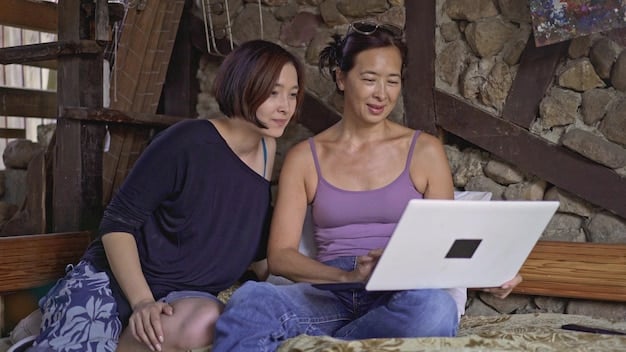Decoding Japanese Drama Slang: Your Ultimate J-Drama Phrase Guide

Advertisements
Japanese drama slang unlocks a deeper understanding and enjoyment of J-dramas, offering insights into character relationships, cultural nuances, and frequently used expressions that don’t always translate directly.
Unlocking the secrets of Japanese dramas (J-dramas) goes beyond subtitles. Dive into the world of Japanese drama slang, where common phrases reveal cultural nuances and character relationships that might be missed in translation. This guide will equip you with the essential slang to elevate your viewing experience.
Anúncios
Understanding Japanese Drama Slang: An Introduction
Japanese dramas, or J-dramas, are a window into Japanese culture, society, and everyday life. While subtitles provide a general understanding, they often miss the subtle nuances and cultural references embedded in the slang used by characters. Understanding Japanese drama slang not only enhances your comprehension but also enriches your appreciation for the storytelling and character development.
Think of it as learning the inside jokes of a close-knit community. Slang expressions often carry layers of meaning that reflect social dynamics, emotional states, and unspoken expectations. By familiarizing yourself with these phrases, you’ll gain a deeper understanding of the characters’ motivations, their relationships, and the overall themes of the drama.
Anúncios
Why Learn J-Drama Slang?
Learning slang can significantly improve your viewing experience.
- Enhanced Comprehension: Slang fills in the gaps that subtitles often miss, providing a more complete understanding of dialogues and interactions.
- Cultural Insight: Slang expressions offer a glimpse into Japanese values, humor, and social norms.
- Deeper Appreciation: Understanding the nuances of slang adds depth to your appreciation of the drama’s storytelling and character development.
- Connection to Characters: Slang can reveal the emotional states and relationships between characters, fostering a stronger connection to the story.
Ultimately, knowing Japanese drama slang elevates your enjoyment of J-dramas, allowing you to immerse yourself more fully in the world of the characters and their stories.

Essential J-Drama Slang for Beginners
Embarking on your journey into J-drama slang can seem daunting, but starting with a few essential phrases can make a world of difference. These common expressions appear frequently in dramas, providing a solid foundation for understanding more complex slang later on. Let’s explore some fundamental phrases.
These phrases will pop up again and again, and will help you feel more immersed in any Japanese drama you pick!
Common Greetings and Farewells
Basic greetings and farewells often have subtle variations.
- Ohayo (おはよう): Good morning. A casual greeting, especially among friends or family.
- Konnichiwa (こんにちは): Good afternoon/hello. A standard greeting used during the daytime.
- Konbanwa (こんばんは): Good evening. Used to greet someone in the evening.
- Oyasumi (おやすみ): Good night. Used when going to bed or saying goodbye at night.
- Sayonara (さようなら): Goodbye. A more formal farewell, implying a longer separation.
Everyday Expressions
Knowing these expressions will get you far!
- Itadakimasu (いただきます): Said before a meal, expressing gratitude for the food.
- Gochisousama deshita (ごちそうさまでした): Said after a meal, expressing thanks for the delicious food.
- Tadaima (ただいま): I’m home. Said upon returning home.
- Okaeri (おかえり): Welcome home. Said to someone returning home.
- Wakarimashita (わかりました): I understand/I got it.
Mastering these essential greetings, farewells, and everyday expressions will significantly enhance your ability to follow conversations and understand the flow of interactions in J-dramas. These phrases serve as building blocks for grasping more complex slang and linguistic nuances.
Slang Related to Relationships and Love
Relationships and love are central themes in many J-dramas. Understanding the slang used to describe these dynamics can deepen your appreciation for the characters’ emotions and motivations. Let’s explore some common expressions related to relationships and love.
These phrases will add new and exciting context to certain romantic relationships in Japanese Drama.
Describing Affection
How affection is expressed can be culturally significant.
- Suki (好き): Like/love. A general term for expressing affection or preference.
- Daisuki (大好き): Love very much. A stronger expression of love.
- Aishiteru (愛してる): I love you. A more profound and serious declaration of love.
- Kareshi (彼氏): Boyfriend.
- Kanojo (彼女): Girlfriend.
Navigating Relationships
Relationships go through the range of human emotions.
- Kokuhaku (告白): Confession of love. The act of expressing romantic feelings to someone.
- Furareta (振られた): Rejected. Being turned down after a confession of love.
- Goukon (合コン): Group date. A social gathering where single people meet potential partners.
- Tsundere (ツンデレ): A character archetype who is initially cold and hostile but gradually reveals a warmer, more affectionate side.
- Senpai (先輩): Senior. An upperclassman or someone with more experience. Often used in romantic contexts in school dramas.

By grasping these slang terms, you can better understand the nuances of relationships depicted in J-dramas, from the initial spark of attraction to the complexities of love and heartbreak. These expressions capture a wide range of emotions and situations, providing valuable insights into the characters’ inner worlds.
Slang Used in School Dramas
School dramas are a popular genre in Japan, offering a glimpse into the lives of students, their friendships, and their struggles. Understanding the slang commonly used in these dramas can enhance your appreciation for this genre. Let’s delve into some key phrases specific to school settings.
School drama is a very common trope in Japanese drama.
Student Life
Phrases related to school often capture the essence of student life.
- Seito (生徒): Student.
- Sensei (先生): Teacher.
- Jugyou (授業): Class/lesson.
- Shukudai (宿題): Homework.
- Bukatsu (部活): Club activity. Extracurricular activities that are a significant part of student life.
School Interactions
School Interactions are often intense.
- Ijime (いじめ): Bullying. A serious issue often depicted in school dramas.
- Tomodachi (友達): Friend.
- Nakama (仲間): Close friends/comrades. Emphasizes a strong bond and sense of belonging.
- Bunkasai (文化祭): Cultural festival. A major school event involving performances, exhibitions, and food stalls.
By familiarizing yourself with these slang terms, you can better understand the dynamics of student life as portrayed in J-dramas. These phrases capture the essence of school interactions, friendships, and the challenges faced by students.
Slang Related to Work and Society
Beyond school and romance, J-dramas often explore the world of work and broader societal issues. Understanding the slang related to these themes can provide valuable insights into Japanese culture and values. Let’s examine some common expressions used in professional and social contexts.
Understanding this sort of slang adds depth and meaning to a wide category of content.
Workplace Dynamics
The workplace has its own specific culture.
- Kaisha (会社): Company.
- Shachou (社長): Company president.
- Buchou (部長): Department manager.
- Senpai (先輩): Senior colleague.
- Kouhai (後輩): Junior colleague.
Social Interactions
Social interactions between co-workers also has its own specific language.
- Nomikai (飲み会): Drinking party. A common social event among colleagues.
- Karoshi (過労死): Death from overwork. A serious social issue in Japan.
- Honne (本音): True feelings. Expressing one’s genuine thoughts and emotions, often suppressed in formal settings.
- Tatemae (建前): Public face/official stance. The socially acceptable facade maintained in public, often contrasting with one’s honne.
By understanding these terms, you can better understand the nuances of J-dramas depicting workplace environments, social gatherings, and societal expectations. These expressions reveal the complexities of Japanese culture, where hierarchy, harmony, and indirect communication play significant roles.
Tips for Learning and Remembering J-Drama Slang
Learning new slang can be challenging, but with the right strategies, you can make the process more effective and enjoyable. Here are some practical tips for learning and remembering **Japanese drama slang**:
Learning slang can be difficult, but this is how to make it easier.
Active Listening
This is where real learning begins.
- Pay attention to context: Notice how the slang is used in different situations and by different characters.
- Look for patterns: Identify recurring phrases and try to understand their underlying meanings.
- Take notes: Jot down new slang terms along with their explanations and examples.
- Rewatch scenes: Focus on scenes where slang is prominently used and try to decipher the meaning.
Effective Study Techniques
Consistent study will solidify your knowledge.
- Use flashcards: Create flashcards with the slang term on one side and the explanation on the other.
- Practice with native speakers: Engage in conversations with Japanese speakers and try to incorporate the slang you’ve learned.
- Use online resources: Explore online dictionaries, forums, and language learning apps that focus on Japanese slang.
- Immerse yourself in Japanese culture: Watch more J-dramas, listen to Japanese music, and read Japanese books to further expand your vocabulary and understanding of slang.
By combining active listening, effective study techniques, and consistent practice, you can master **Japanese drama slang** and enhance your overall language skills.
| Key Phrase | Brief Description |
|---|---|
| 🗣️ “Itadakimasu” | Said before meals to express gratitude for the food. |
| ❤️ “Kokuhaku” | Confessing love, a common theme in J-dramas. |
| 🏢 “Kaisha” | Refers to the company; essential for workplace drama |
| 🤝 “Nakama” | Signifies close friends or comrades with a strong bond. |
Frequently Asked Questions (FAQ)
▼
Understanding J-drama slang enhances comprehension by filling in gaps subtitles miss, offers cultural insights into Japanese values, and adds depth to your appreciation of storytelling, ultimately creating a more immersive viewing experience.
▼
Essential terms include greetings like “Ohayo” (Good morning) and “Konnichiwa” (Hello), expressions like “Itadakimasu” (said before meals), and terms related to liking someone, such as “Suki” (like/love).
▼
Slang related to love, such as “Kokuhaku” (confession of love) and “Furareta” (rejected), allows you to understand the nuances of relationships, emotions, and character motivations more effectively.
▼
Learning workplace slang, like “Kaisha” (company) and “Shachou” (president), helps you understand workplace dynamics and the social issues that these dramas explore, adding depth to your viewing.
▼
Effective study methods include active listening, note-taking, using flashcards, practicing with native speakers, and immersing yourself in Japanese culture, such as watching more J-dramas.
Conclusion
By mastering Japanese drama slang, you’ll not only enhance your understanding of the dialogues but also gain valuable insights into Japanese culture, relationships, and society. With consistent practice and a curious spirit, you’ll be well-equipped to unlock the full potential of your J-drama viewing experience.





